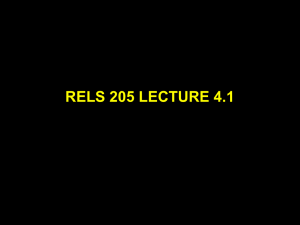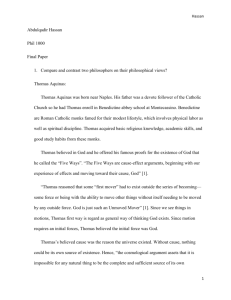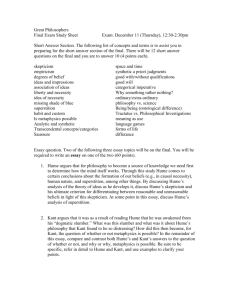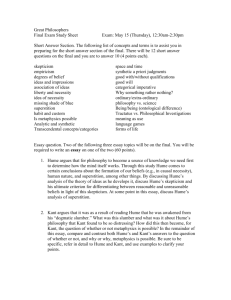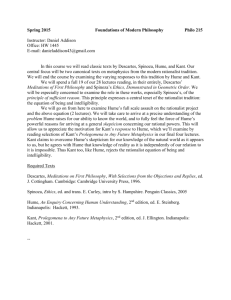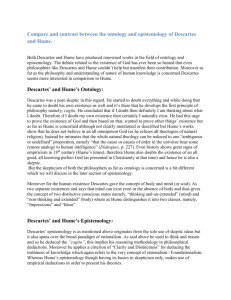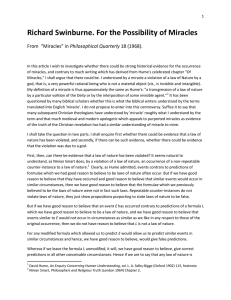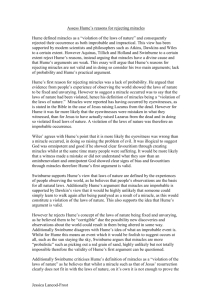Miracles and Religious Experience
advertisement
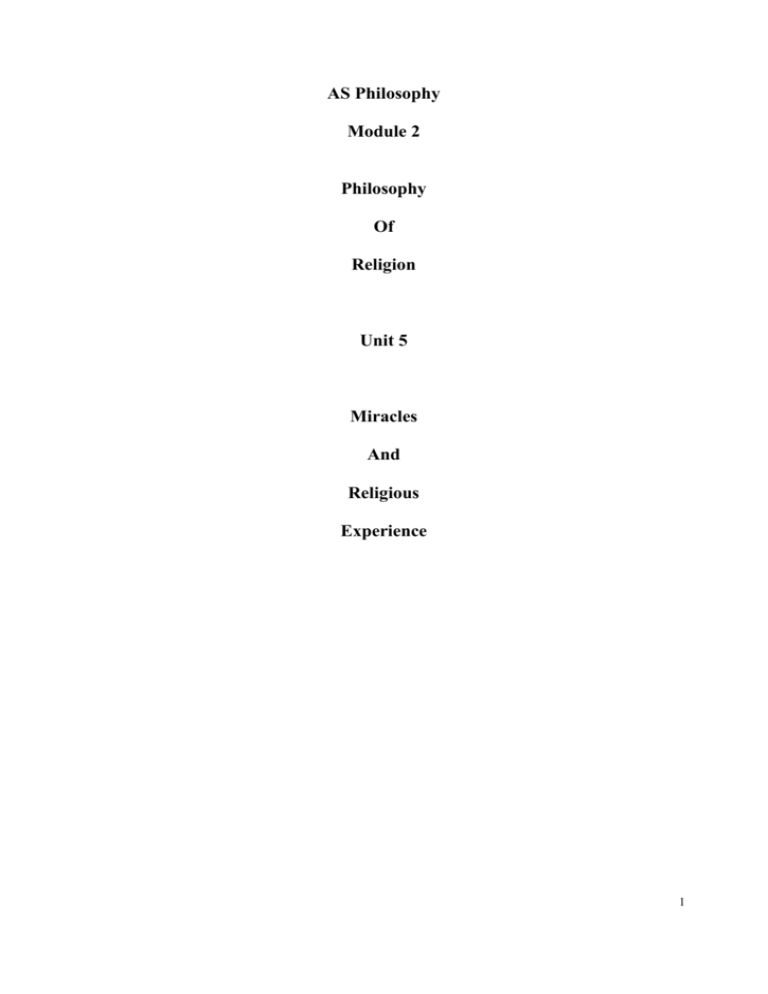
AS Philosophy Module 2 Philosophy Of Religion Unit 5 Miracles And Religious Experience 1 Miracles and Religious Experience Introduction As mentioned earlier - in the Argument from Religious Experience section of Proofs - the concept of "miraculous", for religious purposes, is usually applied to those events which can only be explained by divine intervention. Turning water into wine, raising the dead, parting the sea these are all things which the religious believer wants to say prove the existence of God. In the earlier section we looked at some of the problems which the religious believer faces in using miracles as proof, but now we will look at the concept of the miracle itself in more detail. Hume's Objections In section 10 of Hume's Enquiries Concerning Human Understanding, the author sets out his view of miracles. Anyone familiar with Hume's view of cause and effect will recognise the same reasoning at work here. Hume's view, called his Regularity Thesis, is basically this: 1. Our view of events is based on experience 2. How reliable or predictable an event is depends on how often it has been experienced 3. Miracles are, by definition, things that are very rarely said to occur 4. Therefore it is very unlikely that miracles do occur Next, Hume's first approach to a possible miracle would be to question the credentials of the people who saw it. Were they drunk? Are they the sort of people who might lie? Also, Hume suggests that we try to find out other factors such as the quality of the light, the mental state of the people involved, etc. This part of the argument is called the Probability Thesis. The upshot of all this is that, from Hume's point of view, a miracle is just about the least likely thing that can happen. Rather, he thinks that it is more likely to be the result of gullibility, lack of reliable witnesses or lack of sophistication on the part of the believer. Questions 1. Is the most probable thing always the most true? Can you think of any examples that could be used against Hume? 2. Is regularity necessarily a criterion for truth? Again, think of some examples that might contradict Hume. 3. Only a small number of people have ever landed on the moon - does this mean it didn't happen? How might Hume deal with this argument? 4. If a miracle is by definition something that rarely happens, is Hume right to use these arguments against it? Exercise 2 Take a miracle from the Bible – How might Hume criticise it? Are there any counter arguments to him? Religious Experience Introduction What we call religious experiences can differ greatly. Some reports exist of supernatural happenings that it would be difficult to explain from a rational, scientific point of view. On the other hand, there also exist the sort of testimonies that simply seem to convey a feeling of peace or oneness - something which most of us, religious or not, may possibly relate to. In categorising religious experiences it is perhaps helpful to look at them as explicable through one of two theories: the Objectivist thesis or the Subjectivist thesis. Objectivism The first of these theses, the Objectivist view, supposes that there is some object or actual entity such as God - which exists independently of the experience, interaction with which causes the experience itself. An objectivist would argue that the religious experience is a proof of God's existence. However, others have criticised the reliability of religious experiences. The English philosopher Thomas Hobbes asked how it was possible to tell the difference between talking to God in a dream, and dreaming about talking to God. The Objectivist thesis is ultimately the most traditional viewpoint since it views God as an "object" - that is, something that exists independently of us (such as a table or another person). There are a number of problems with this: (a) How do we know that what we are experiencing is actually God (and not our imagination, or even some other being)? (b) If there is no objective means of testing for God's existence, how can we be sure that He is the object causing the experience? Antony Flew makes this point when he asks what sort of experience might act as objective proof of God's existence? The same as we would use for another person or a table? (c) If God is an object or person in the world, doesn't this make God finite, subject to limitation, etc? Subjectivism The Subjectivist view argues that it is not necessary to think of religious experiences as evidence for the existence of an actual being whom we call God. From this point of view, the important thing is the experience itself and the effect that it has on the individual. The advantage of this view is that it avoids all the tricky questions such as "Why doesn't God answer my prayers?" This is because prayer is not seen as an appeal to an external being, but rather a process whereby the person praying may change his or her self. 3 The obvious problem with this is that it almost does away with the idea of God. If all proofs and arguments for His existence can be ignored, is this any different to saying that God is only a metaphor for a certain attitude to life? Is God just like Father Christmas? The other main problem with this viewpoint is that it seems to promote what is called Fideism that is, unfounded belief. For instance, we may defend a religious statement by saying that it is the importance that it has in a person's life that constitutes it meaning. So, if I beleive that a spaceship will come down and take my family and I to Sirius - but only if we all kill ourselves first - how can anyone argue against me? Any argument that is used can be ignored on the basis that "You don't understand what I mean". But the only way to understand what I mean is to believe what I beleive. So, by saying that my beliefs have a subjective meaning seems to cut me off from objective reality - doesn't it? We will look at this again when we come to consider Wittgenstein's later views in the Language Games section. Questions 1. How can we differentiate religious experiences from hallucinations, mental illness, etc.? 2. How do we know a religious experience is genuine? Who would judge? 3. The diversity of religious experience provides a problem for the objectivist view - what is it? 4. Are there any other possible explanations for religious experiences? 5. Need such experiences be religious? 6. The subjectivist view has been criticised for being "Fideistic" (fideism is unfounded belief) do you agree? 4
